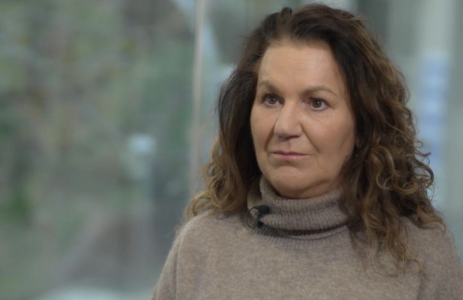Avoid Fadwa's Mistake: The Crucial Information That Could Save You Over $50K in Medical Bills
By
Seia Ibanez
- Replies 2
As we age, the importance of maintaining good health becomes increasingly clear, and often, it's the small daily habits that can have the most significant impact on our long-term well-being. This was a lesson learned the hard way by Fadwa Mollat, a 61-year-old from NSW, who overlooked a simple step in her daily routine and ended up with a major medical problem that cost her over $50,000 in treatments.
Fadwa's story is a cautionary tale for all of us, especially as we enter our golden years when health issues can become more prevalent and more challenging to address. At the age of 26, Fadwa began to notice troubling signs: bleeding and swollen gums, difficulty eating, and eventually, wobbly and discolored teeth. It wasn't until she visited a periodontist that she was diagnosed with severe gum disease, a condition that required multiple procedures, including deep cleaning of the gums and the installation of six dental implants due to tooth loss.
'The gum disease causes your bone to disintegrate,' Mollat explained, sharing how her teeth, once her pride and joy, became a source of depression as she faced the loss of one of her best assets. The root cause? A lack of proper dental hygiene practices, such as flossing and brushing twice daily—habits that were not instilled in her during childhood and that she neglected in her adult life, particularly after nights out. Additionally, her smoking habit, which was known to affect the lungs, also contributed to her gum disease, a connection she was unaware of at the time.
Fadwa's experience is far from unique. According to a survey conducted by the Australian Dental Association (ADA) at the end of 2023, a significant number of Australians are neglecting their dental health. The survey revealed that one in four respondents had inflamed gums, and one in three suffered from moderate to severe gum disease. Dr. Chris Sanzaro, a federal executive councillor for the ADA, emphasized the broader health implications of poor oral hygiene, linking gum disease to heart disease, diabetes, pre-term births, and even arthritic and bowel conditions.
Despite these alarming connections, the ADA's research found that 25% of respondents did not consider the health of their gums, and many were unaware of the quick response of gums to proper cleaning. 'Once you start cleaning properly, the changes happen within the first 10 or 14 days—the gums look much happier and healthier,' Dr. Sanzaro stated.
The cost of dental care, however, remains a significant barrier for many Australians. The ADA survey noted that cost-of-living pressures have led three in five people to postpone their annual dental check-ups. The federal government's Senate Select Committee has recognized the need for more funding to make oral health services more affordable, particularly for vulnerable groups such as seniors, Aboriginal Australians, and those living with disabilities. Yet, despite acknowledging the recommendations, the government has not committed to concrete action, leaving many Australians without the support they need to prevent and treat dental issues.
Fadwa's ordeal is a powerful reminder of the importance of daily dental care and the potential financial and emotional costs of neglect. As members of the Seniors Discount Club, we must take our oral health seriously and advocate for better access to affordable dental care. By incorporating simple habits like brushing twice a day, flossing regularly, and attending routine dental check-ups, we can protect not only our smiles but also our overall health and wallets.

We invite you to share your experiences with dental care and any tips you have for maintaining good oral hygiene. Have you faced similar challenges, or do you have a success story about overcoming dental issues? Let's start a conversation in the comments below and help each other avoid the costly mistakes that can impact our quality of life.
Fadwa's story is a cautionary tale for all of us, especially as we enter our golden years when health issues can become more prevalent and more challenging to address. At the age of 26, Fadwa began to notice troubling signs: bleeding and swollen gums, difficulty eating, and eventually, wobbly and discolored teeth. It wasn't until she visited a periodontist that she was diagnosed with severe gum disease, a condition that required multiple procedures, including deep cleaning of the gums and the installation of six dental implants due to tooth loss.
'The gum disease causes your bone to disintegrate,' Mollat explained, sharing how her teeth, once her pride and joy, became a source of depression as she faced the loss of one of her best assets. The root cause? A lack of proper dental hygiene practices, such as flossing and brushing twice daily—habits that were not instilled in her during childhood and that she neglected in her adult life, particularly after nights out. Additionally, her smoking habit, which was known to affect the lungs, also contributed to her gum disease, a connection she was unaware of at the time.
Fadwa's experience is far from unique. According to a survey conducted by the Australian Dental Association (ADA) at the end of 2023, a significant number of Australians are neglecting their dental health. The survey revealed that one in four respondents had inflamed gums, and one in three suffered from moderate to severe gum disease. Dr. Chris Sanzaro, a federal executive councillor for the ADA, emphasized the broader health implications of poor oral hygiene, linking gum disease to heart disease, diabetes, pre-term births, and even arthritic and bowel conditions.
Despite these alarming connections, the ADA's research found that 25% of respondents did not consider the health of their gums, and many were unaware of the quick response of gums to proper cleaning. 'Once you start cleaning properly, the changes happen within the first 10 or 14 days—the gums look much happier and healthier,' Dr. Sanzaro stated.
The cost of dental care, however, remains a significant barrier for many Australians. The ADA survey noted that cost-of-living pressures have led three in five people to postpone their annual dental check-ups. The federal government's Senate Select Committee has recognized the need for more funding to make oral health services more affordable, particularly for vulnerable groups such as seniors, Aboriginal Australians, and those living with disabilities. Yet, despite acknowledging the recommendations, the government has not committed to concrete action, leaving many Australians without the support they need to prevent and treat dental issues.
Fadwa's ordeal is a powerful reminder of the importance of daily dental care and the potential financial and emotional costs of neglect. As members of the Seniors Discount Club, we must take our oral health seriously and advocate for better access to affordable dental care. By incorporating simple habits like brushing twice a day, flossing regularly, and attending routine dental check-ups, we can protect not only our smiles but also our overall health and wallets.
Key Takeaways
- Fadwa Mollat, now 61, incurred over $50,000 in medical bills due to severe gum disease that could have been avoided with proper oral hygiene.
- One in three Australians is reported to have moderate to severe gum disease, with concerns over a lack of oral health awareness in the country.
- Dental experts stress the importance of regular brushing and the link between healthy gums and overall health, with poor oral hygiene associated with exacerbating several health conditions.
- The high cost of dental care and living pressures are causing Australians to postpone dental visits, and while the government acknowledges the need for more affordable dental services for vulnerable populations, no firm commitment has been made.
We invite you to share your experiences with dental care and any tips you have for maintaining good oral hygiene. Have you faced similar challenges, or do you have a success story about overcoming dental issues? Let's start a conversation in the comments below and help each other avoid the costly mistakes that can impact our quality of life.








